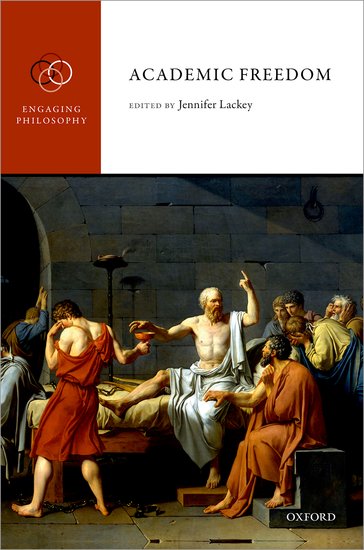This book is an entry in the series Engaging Philosophy, and like previous volumes in the series it consists of essays by a variety of contributors.
 As the series title indicates, the various authors are approaching the issues around academic freedom specifically from a philosophical standpoint, addressing foundational questions such as the differences between the norms of free speech generally and those of academic freedom specifically, the interactions of the right to protest and the right to speak, complexities of academic speech in the classroom, and the appropriateness of “no-platforming” and other forms of silencing within academia. The book is divided into five sections (including the editor’s introduction), each featuring two or three essays for a total of eleven; the sections are titled “The Rationale for Academic Freedom,” “The Parameters of Academic Freedom,” “Silencing and Beyond: Microaggressions, Content Warnings, and Political Correctness,” and “Protests, Civil Disobedience, and No Platforming.”
As the series title indicates, the various authors are approaching the issues around academic freedom specifically from a philosophical standpoint, addressing foundational questions such as the differences between the norms of free speech generally and those of academic freedom specifically, the interactions of the right to protest and the right to speak, complexities of academic speech in the classroom, and the appropriateness of “no-platforming” and other forms of silencing within academia. The book is divided into five sections (including the editor’s introduction), each featuring two or three essays for a total of eleven; the sections are titled “The Rationale for Academic Freedom,” “The Parameters of Academic Freedom,” “Silencing and Beyond: Microaggressions, Content Warnings, and Political Correctness,” and “Protests, Civil Disobedience, and No Platforming.”
In the first major section, editor Jennifer Lackey walks the reader through an overview of current and historical issues around academic freedom, discussing parameters of that freedom including the protection of faculty from political pressure external to their institutions and the insulation of faculty from institutional pressure on the part of administrators. She addresses questions about whether protection from such institutional and state pressure is sufficient in light of recent changes in society — notably the advent of the Internet — and also whether and how expectations of “civility” interact with questions of academic freedom. She concludes that while “academic freedom plays an indispensable role in fulfilling the mission of the university,” recent social and technological developments have created new questions about the nature and application of academic freedom and leave contemporary academics in “uncharted territory.” Hence the essays that then follow.
Those essays range from the philosophically fundamental (Michael P. Lynch’s “Academic Freedom and the Politics of Truth,” which draws on the legacies of Richard Rorty and John Dewey to interrogate the instrumental utility of academic freedom in light of different views of what “truth” is) to the highly practical and timely (Martha Nussbaum’s contribution being a strong example of that approach).
Often, the essays address both the philosophically fundamental and the mundane and practical, as is the case with Michele Moody-Adams’ careful and nuanced navigation of the “safe space” concept in contemporary academia, and Jennifer Saul’s thorough interrogation of the concept (and academic applications, both appropriate and inappropriate) of “silencing” and her call for an “enriched” vocabulary and conceptual arsenal in discussion of it. From the more theoretical end of the spectrum, Philip Pettit dives deeply into the difference between speech that is “free” by virtue of its being unhindered and speech that is “free” by virtue of its being “suitably protected.” Focusing more on the “realpolitik of academic freedom,” John Protevi examines the academic-freedom implications of the Steven Salaita case. (Here it might have been interesting to also provide a viewpoint from someone who had not been actively involved in Salaita’s public defense; Protevi’s involvement extended to organizing a boycott against the university that Salaita sued, leading the reader perhaps to wonder how dispassionate the author’s analysis is.)
Other authors discuss issues surrounding the freedom to choose topics of research, civil disobedience, and the vexing complexities of political correctness and microaggressions. On this last topic Mary Kate McGowan is particularly insightful, drawing important distinctions between the concepts of “offense” and “harm,” and closely analyzing the various ways in which students may be silenced by others either directly or (through the choice to remain silent in the face of anticipated reaction) indirectly. David Estlund is similarly persuasive in his essay on “When Protest and Speech Collide,” noting that “when speech interferes with speech, the set of values gathered under the deceptively simple phrase ‘free speech’ are multiple and intricately related,” and drawing careful distinctions between the legal and moral imperatives of speech freedom. Martha Nussbaum provides an exceptionally useful and clearly-argued essay on the ways in which free speech and civil disobedience both differ and can overlap, comparing the ways they do so in the university setting with the ways they interact in the larger world. Robert Mark Simpson and Amia Srinivasan’s (partial) defense of “no platforming,” by contrast, is somewhat less compelling — particularly to the degree that it relies on the argument that “there are graver threats to academic freedom than anything arising out of progressive student activism.” (Indeed there are, but what does that have to do with what is meant to be a rigorous philosophical examination of this particular issue?)
The book is very well edited, and very poorly printed. I was, in fact, frankly shocked by the poor production quality of this book; the text looks like it was produced by a cheap inkjet printer.
Overall, Academic Freedom offers a highly useful and insightful overview of an issue that is — or should be — or deep and abiding concern to anyone committed to education, scholarship, and civil rights.
(Disclosure: My most recent book, Scholarly Communication: What Everyone Needs to Know, was also published by Oxford University Press.)



